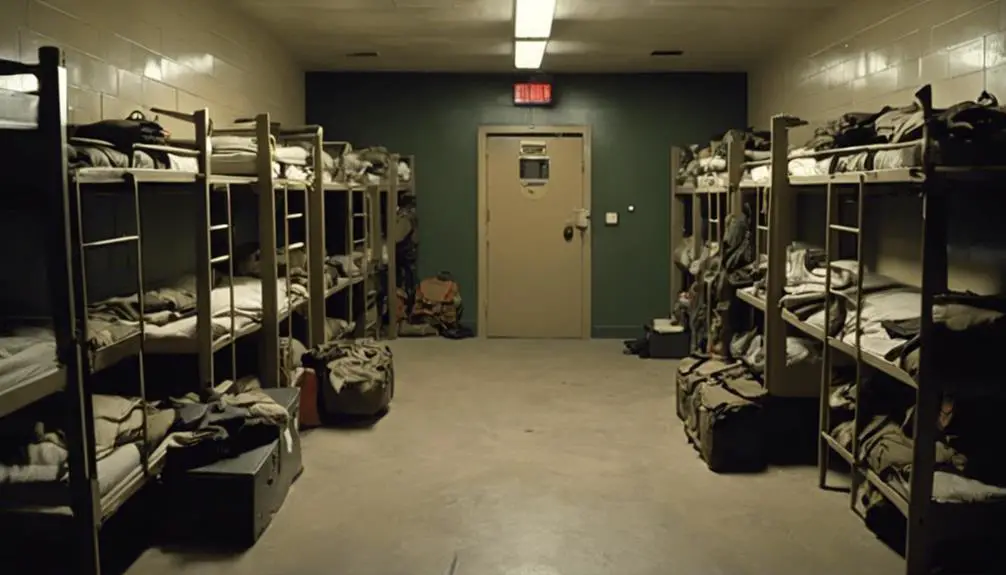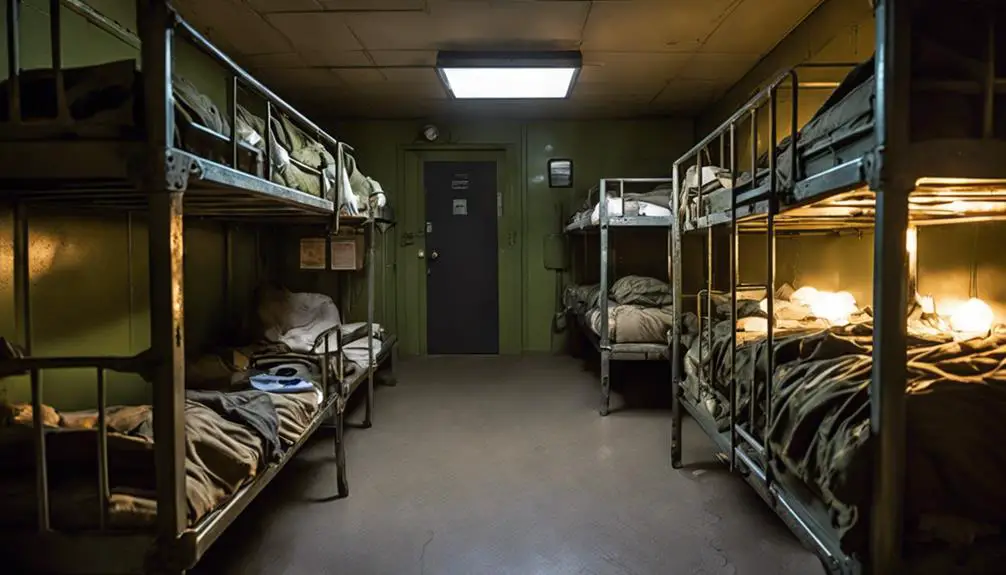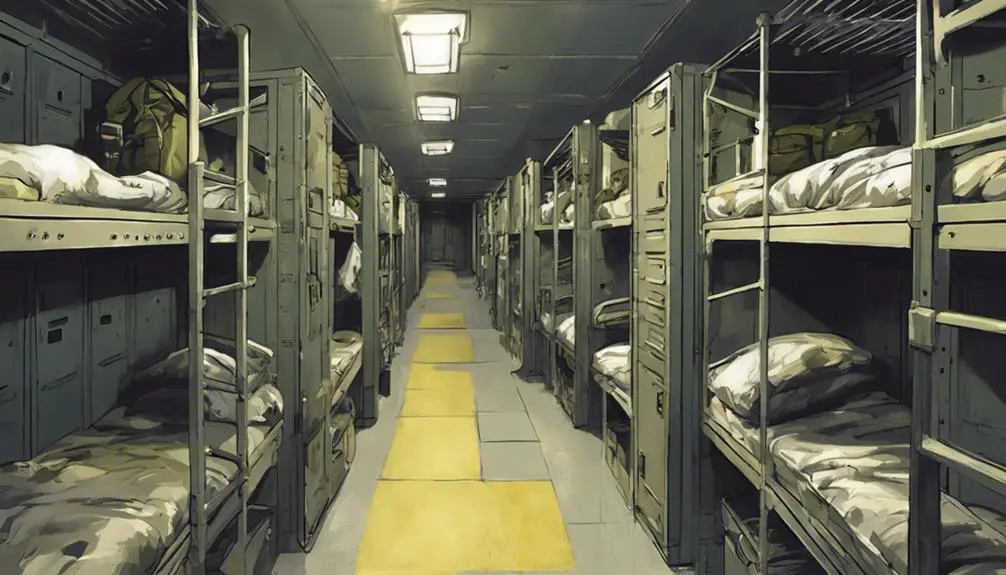You're about to enter the world of military slang, where 'crew quarters' is more than just a place to rest. You'll discover that 'rack' means bed, 'sack' refers to sleep, and 'billets' are living quarters. You'll also learn about 'hot-racking', sharing a bunk on different shifts, and 'racking out', hitting the sack for rest. As you explore further, you'll uncover more terms like 'head' for bathroom, 'galley' for kitchen, and 'scullery' for a small kitchen area. Venture deeper to uncover the unique lingo that bonds service members together.
Decoding Military Bedroom Lingo

In the close quarters of a military bedroom, you'll often hear slang terms like 'rack' for bed, 'sack' for sleep, and 'billets' for living quarters, which can be bewildering for outsiders. As you navigate the labyrinth of military language, understanding the nuances of crew quarters slang is vital.
Bunk assignments, for instance, are an important aspect of squad dynamics. You'll soon learn that 'hot-racking' refers to sharing a bunk with someone who's on a different shift, while 'racking out' means hitting the sack for some much-needed rest.
In this environment, communication is key, and using the right terminology can make all the difference. You'll quickly pick up on phrases like 'sack time,' which signals the end of the day, and 'billets,' which refer to your living quarters.
As you settle into your new surroundings, you'll begin to appreciate the importance of clear communication and teamwork. By mastering this unique language, you'll not only avoid confusion but also forge stronger bonds with your squad.
In the close-knit world of military bedrooms, understanding the lingo is crucial to building trust and camaraderie.
Unofficial Terms for Facilities
You'll soon discover that military facilities have their own set of unofficial terms, like 'head' for bathroom and 'galley' for kitchen, which quickly become second nature in your daily routine. As you navigate your new environment, you'll pick up on these Barracks Basics and Facility Nicknames that'll make you sound like a pro in no time.
Here are a few essential terms to get you started:
- Scullery: a small kitchen or food prep area
- Rack: your bed or sleeping quarters (not to be confused with the official term for your bed, which is 'berth')
- Sick Bay: the medical facility or hospital on base
Mastering these unofficial terms will help you communicate effectively with your fellow crew members and show that you're committed to learning the ins and outs of military life. Remember, it's all about adapting to the unique culture and lingo of your new community.
Sleeping Quarters Slang

Two essential sleeping quarters slang terms to commit to memory are 'rack' and 'cube'. You'll hear these terms frequently in military quarters, so it's important to know what they mean.
A 'rack' refers to your bed or bunk, where you'll be catching those precious z's. Meanwhile, a 'cube' is your personal space or quarters, which might include your bunk, locker, and some personal belongings.
When you're settling into your cube, you'll likely have Bunk Buddies nearby. These are your fellow service members who share the same sleeping quarters as you. You'll get to know them well, so be prepared to build some strong bonds.
Quarter Calls are another important aspect of sleeping quarters slang. These are announcements made over the public address system, usually to inform you of important events or schedule changes. You'll need to stay alert and listen up when you hear those Quarter Calls, as they often contain crucial information.
Messing With Food and Drink
When chowing down in the military's mess hall, you'll need to know the lingo to avoid confusion and frustration. Familiarize yourself with the slang used in the galley (kitchen) to fit in with your fellow service members. You'll hear phrases like 'chow time' (mealtime) and 'scullery duty' (cleaning up after meals), but what about the secrets and gossip shared among the cooks?
Here are a few essential terms to know:
- Galley gossip: The rumors and stories spread among the cooks and food handlers about what's really going on in the kitchen.
- Scullery secrets: Insider information about the menu, cooking techniques, and behind-the-scenes kitchen drama.
- Mess crone: The person in charge of managing the mess hall, responsible for ensuring food quality and cleanliness.
Cleaning and Hygiene Code

Maintaining a spotless kitchen is essential, as sloppy cleaning habits can lead to the spread of diseases and pests, earning you a reputation as a 'mess menace' among your fellow service members. You'll want to uphold the highest Sanitary Standards, ensuring all surfaces, utensils, and equipment are clean and sanitized regularly.
This includes washing your hands frequently, especially before handling food and after using the restroom.
Personal Grooming is also vital in the crew quarters. You'll need to keep yourself clean and well-groomed, adhering to the military's grooming standards. This means showering regularly, trimming your hair and nails, and keeping your uniform clean and pressed.
Military Lingo for Leisure
You'll soon find that military slang seeps into your downtime, too, as you relax with buddies and blow off steam in the crew quarters. Your recreational routines and leisurely pastimes are no exception. Military lingo becomes a natural part of your conversation, even when you're unwinding.
Here are some examples of military slang you might use during your downtime:
- 'Rack out': When you're feeling tired and need to catch some Z's, you'll 'rack out' and get some rest.
- 'Chillax': When someone's getting too worked up, you'll tell them to 'chillax' and take it easy.
- 'Veg out': After a long day, you might 'veg out' and spend some quality time on the couch, binge-watching your favorite show.
As you settle into life in the crew quarters, you'll find that military slang becomes an integral part of your daily conversation, even in your leisure time. It's just one more way that military culture shapes your daily life, from waking up to winding down.
Frequently Asked Questions
Can Civilians Use Military Slang in Casual Conversations?
You wonder if civilians can use military slang in casual conversations. The answer is, you can, but be mindful of social acceptability.
Using military slang can add flavor to your everyday language, but overdoing it might come across as pretentious. Use it sparingly, and you'll sound cool; overuse it, and you might raise eyebrows.
Blend it into your everyday language, and you'll be just fine.
Is Military Slang Different Across Various Branches?
Imagine you're exploring a linguistic maze, where each turn reveals a new dialect. You're pondering if military slang differs across branches, and the answer is yes.
Branch variations are as distinct as fingerprints. The Army has its own service idioms, like 'HOOAH' (Heard, Understood, Acknowledged), while the Navy uses 'BRASS' (Bold, Resourceful, Adaptable, Skilled, and Selfless).
Each branch has its unique flavor, making military slang a rich tapestry of language.
Are All Military Slang Terms Officially Recognized?
You're wondering if all military slang terms are officially recognized?
The answer is no. While some slang terms have been adopted into official doctrine, many others remain informal and unofficial.
Slang origins often stem from cultural and historical contexts, making it difficult for regulatory oversight to keep pace.
As a result, many slang terms remain grassroots, used by military personnel but not formally recognized by higher authorities.
Can Military Slang Be Used in Formal Writing?
When you're writing formally, you might wonder if military slang has a place. The short answer is, it's best to avoid it.
While slang can be useful in casual contexts, it can blur professional boundaries and undermine formal integration. Stick to standard language to guarantee clarity and maintain a professional tone.
You'll be taken more seriously, and your message will be clearer.
Are There Regional Differences in Military Slang?
You're about to commence on a linguistic mission to uncover the truth about regional differences in military slang. Imagine a map, with different regions as territories, each with its own unique dialect.
Regional dialects, shaped by cultural influences, create a diverse landscape of slang. You'll find that soldiers from the South might use 'y'all' instead of 'you guys,' while those from the Northeast might use 'wicked' to emphasize a point. These variations are a reflection of the cultural melting pot that's the military.
Conclusion
As you navigate the uncharted territory of military slang, remember that decoding the lingo is like cracking a secret code.
You've uncovered the hidden meanings behind 'crew quarters' and other terms, but the journey doesn't end here.
The real battle is staying vigilant, staying informed, and staying one step ahead of the linguistic enemy.
Stay frosty, and don't get left in the dark – keep shining a light on the unofficial terms that keep military facilities running smoothly.







